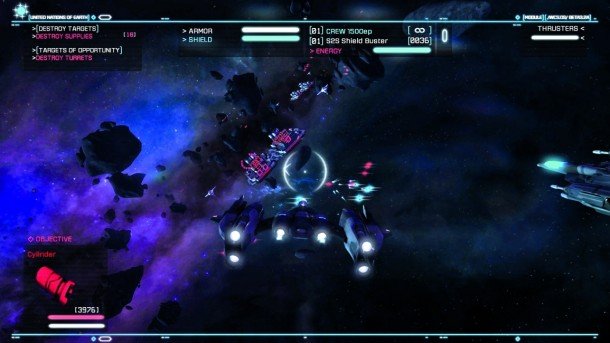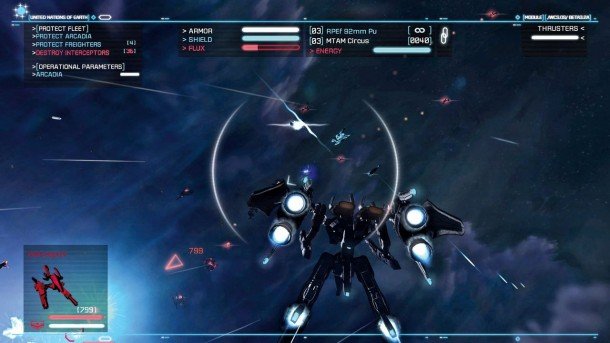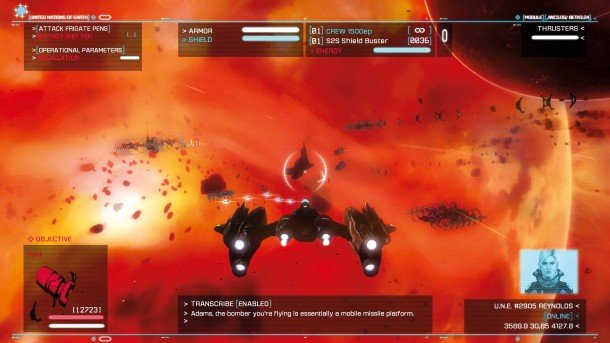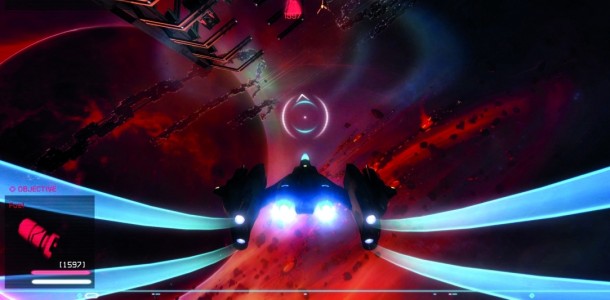Our Verdict
Intuitive and accessible but also repetitive, SSZ is a flight combat game that trades on tradition rather than imagination.
PC Gamer's got your back
Review by Ben Griffin
In 2299, mankind has settled among the stars, multiplying to colonise planets that just a few decades ago it could only dream of reaching. It's all thanks to The Signal, a mysterious transmission that gave Earth the recipe for interstellar travel. But with humanity spread throughout space, decentralised across a new frontier, fractures ripped apart the ranks and aggressive splinter groups emerged to contest Earth's right to rule. This is where Strike Suit Zero finds its conflict, a deep-space-civil-war shooter looking to resurrect the long-dead-likes of Freelancer and X-Wing through zero-gravity combat and 360° battlefields.
Slow to start, Strike Suit Zero powers up like a rusty hyper drive. The first few missions lock away customisable upgrades and trade on wafer-thin dogfights with similarly able ships: you're given the flimsiest fighter with the weakest plasma cannons and tasked with cleaning up space, hunting vagabonds by lining up reticules. This cosmic community service may well have you hankering after something with a bit more bite to it: IL-2 Sturmovik for instance. Despite the backdrop of striking blue nebulae, half-colonised worlds and fractured fringe planets, tasks amount to 'kill X number of X'. It's too little stretched across too much.

Mercifully, it gets better. This is Born Ready's idea of holding back pudding until you finish your main course, and pudding in this case is a giant space robot – the Strike Suit to be precise – and when you're designated test pilot by an enigmatic AI, it signals the start of the game proper. Destroy enemies to earn Flux, and you can transform into the Gundam-esque Strike Suit and unleash ferocious new powers.
The Strike Suit, deployed correctly, is the smart bomb of the game. Mecha mode lasts no more than 30 seconds, but each tick can be spent picking apart squadrons using the many tricks up your armoured sleeve. You can paint targets, fire off plasma volleys, and deal greater damage at greater frequencies. Your Strike Suit is a simple concept among simple concepts, nestling beside the shield and health mechanics (shields regenerate while health doesn't), braking, boosting (use the former to turn sharply and the latter to evade) and EMPs, triggered to fry rockets on your tail.
No matter the scenario, whether assaulting a space station, escorting a convoy or protecting a vulnerable ship (there's a lot of this), combat remains largely the same due to the arcade-basic leanings of the game. Strafing runs prove a primary tactic time and time again as you fire at a target while your shields take a pounding, then scatter before your health is affected. You'll come away with none of Sturmovik's heart-pounding war stories, facing frustration instead as uneven difficulty spikes and idiotic friendly AI lead to the end of the capital ship you're tasked with protecting for the fifth time in a row.

Upgrades attempt to keep things fresh. Before each level, you'll kit out interceptors, fighters, bombers and the Strike Suit with swarm missiles, heat-seekers, plasma bursts, shield-disruptors and unguided rockets, and while it doesn't have the depth of other giant robo-games like Hawken or the consoles' Armored Core, it adds a personal touch. There's a nagging feeling of inconsequentiality though, with everything a variation on a theme: this blue laser or that one?
SSZ does an admirable job recreating the intuitive and instantly accessible flight combat of the games it holds in high regard, but comparisons with the likes of X-Wing and Freelancer aren't valid when mission design is so simple and your wingmates are so dumb.
Expect to pay: $19 / £12
Release: Out now
Developer: Born Ready Games
Publisher: In-house
Link: www.strikesuitzero.com

Intuitive and accessible but also repetitive, SSZ is a flight combat game that trades on tradition rather than imagination.
PC Gamer is the global authority on PC games—starting in 1993 with the magazine, and then in 2010 with this website you're currently reading. We have writers across the US, Canada, UK and Australia, who you can read about here.



